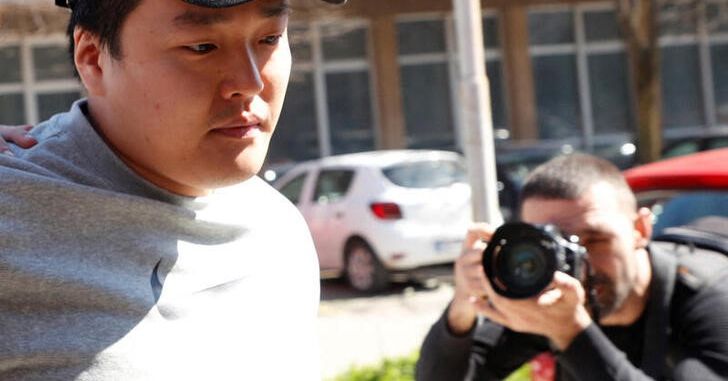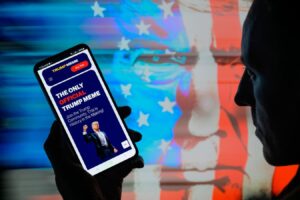Column: Terra Labs ruling casts doubt on crypto reprieve from recent Supreme Court doctrine

Do Kwon, the cryptocurrency entrepreneur, who created the failed Terra (UST) stablecoin, is taken to court in handcuffs, to face charges of forging official documents, in Podgorica, Montenegro, March 24, 2023. REUTERS/Stevo Vasiljevic/File Photo
(Reuters) – A sweeping crypto defense theory that could have shut down the U.S. Securities and Exchange Commission’s enforcement campaign was roundly rejected this week by the first judge to issue a ruling on it.
U.S. District Judge Jed Rakoff of Manhattan refused to dismiss the SEC’s securities fraud case against Terraform Labs and its founder Do Kwon, holding that the government adequately alleged that the defendants sold billions of dollars of unregistered digital assets and deceived investors about the stability of the TerraUSD and Luna algorithmic stablecoins.
Rakoff’s July 31 decision attracted considerable attention because he rejected a framework devised by his Manhattan federal court colleague Analisa Torres for determining whether investments in crypto tokens are securities transactions.
In her July 13 summary judgment decision in the SEC’s enforcement action against Ripple Labs, Torres distinguished between Ripple’s sale of XRP tokens directly to sophisticated institutional investors, which she said are investment contracts subject to SEC regulation, and sales to retail investors over digital asset exchanges, which she said are not. Rakoff said the Supreme Court’s test for securities does not make that distinction.
But the judge’s rejection of Terra’s call to dismiss the SEC’s case based on the U.S. Supreme Court’s “major questions doctrine” could be just as consequential for the agency’s crypto enforcement crusade.
Over the last year, crypto defendants and their allies have made major questions doctrine a centerpiece of their challenges to SEC enforcement, arguing that the Supreme Court’s precedent precludes the SEC from regulating digital assets that were never even contemplated, let alone addressed, when Congress passed federal securities laws in the 1930s.
Rakoff decimated that argument in his Terra decision. But to understand the judge’s ruling, you need some background on major questions doctrine.
The Supreme Court hinted at the basic principles in a 2000 decision barring the U.S. Food and Drug Administration from imposing strict new regulations on tobacco marketing and sales. The theory was taken up by critics of the administrative state, who considered it a bulwark against expanding executive branch power. The justices formally adopted the doctrine in 2022, in a ruling that blocked the U.S. Environmental Protection Agency from regulating greenhouse gas emissions.
Broadly speaking, major questions doctrine holds that in “extraordinary” cases involving matters of great “economic and political significance,” federal agencies cannot act without Congressional authorization to exercise new powers based on old laws.
The crypto industry contends that is exactly what the SEC is doing in its enforcement onslaught against issuers and exchanges. The trillion-dollar crypto market is of vast economic consequence, and it’s obviously a matter of political and regulatory foment. Those are exactly the circumstances, according to defendants, in which the Supreme Court’s doctrine bars the SEC from exceeding the limits of its powers under decades-old laws.
“There is no evidence that the 1930s statutory structure contemplated” cryptocurrencies, Terra argued in its motion to dismiss the SEC case. “Congress has not granted the SEC the power to regulate the digital assets at issue here.”
The SEC responded that Congress gave the agency power to regulate investments “in whatever form they might take.” Congress was deliberately expansive in the language of the Securities Act of 1933 and the Securities and Exchange Act of 1934 because lawmakers anticipated novel investment offerings and wanted the SEC’s mandate to encompass them, the SEC said.
The agency also pointed out that the Supreme Court has only invoked the major questions doctrine in the context of regulation – like the FDA’s new rules for tobacco ads or the EPA’s emissions rules – not enforcement. Terra argued in its reply brief that the Supreme Court talked only about agencies’ unauthorized exercise of power without drawing a line between regulation and enforcement.
Rakoff homed in on a different threshold issue. The Supreme Court, he said, has specified that major questions doctrine is reserved for “extraordinary” cases involving industries of deep economic and political consequence to the U.S.
Crypto, Rakoff said, doesn’t meet that bar. The doctrine, he concluded, simply doesn’t apply.
The judge compared the nascent crypto industry with the tobacco and energy concerns that prompted two of the Supreme Court’s five invocations of the major questions doctrine. Crypto is “certainly important,” Rakoff said. But it would “ignore reality” to suggest that the industry is anywhere near as important as tobacco or energy, the judge said.
Indeed, if crypto were considered to meet the Supreme Court standard for economic and political significance, Rakoff wrote, so too would almost every large industry. And if that were the case, the judge said, “the doctrine would frustrate the administrative state’s ability to perform the function for which Congress established it: the regulation of the American economy.”
For good measure, Rakoff also agreed with the SEC about the expansive scope of its mandate, under federal laws and Supreme Court precedent, to police securities.
“In sum, there is no indication that Congress intended to hamstring the SEC’s ability to resolve new and difficult questions posed by emerging technologies where these technologies impact markets that on their face appear to resemble securities markets,” the judge said. “Defendants cannot wield a doctrine intended to be applied in exceptional circumstances as a tool to disrupt the routine work that Congress expected the SEC and other administrative agencies to perform.”
Terra’s counsel at Dentons did not respond to my query on the judge’s major questions analysis. Terra has said the company “will continue to fight the SEC’s misguided and deeply flawed allegations and legal theories.” An SEC spokesperson declined to comment.
Of course, Rakoff is just one trial judge, albeit one with deep experience in securities litigation, so we will have to see if other courts are more receptive to crypto’s major questions doctrine defenses. But because his ruling is the first to address the issue, future judges will at least have to think hard about Rakoff’s concern that allowing crypto to invoke the doctrine would disrupt routine economic regulation.
Read more:
Terraform Labs must face US SEC fraud allegations, judge rules
Coinbase, crypto industry hope new Supreme Court doctrine is silver bullet
Reporting By Alison Frankel; editing by Leigh Jones
Our Standards: The Thomson Reuters Trust Principles.
Opinions expressed are those of the author. They do not reflect the views of Reuters News, which, under the Trust Principles, is committed to integrity, independence, and freedom from bias.
Source link
#Column #Terra #Labs #ruling #casts #doubt #crypto #reprieve #Supreme #Court #doctrine





